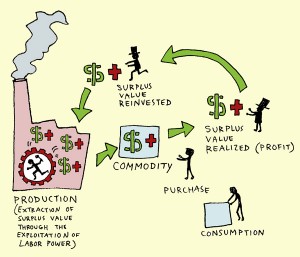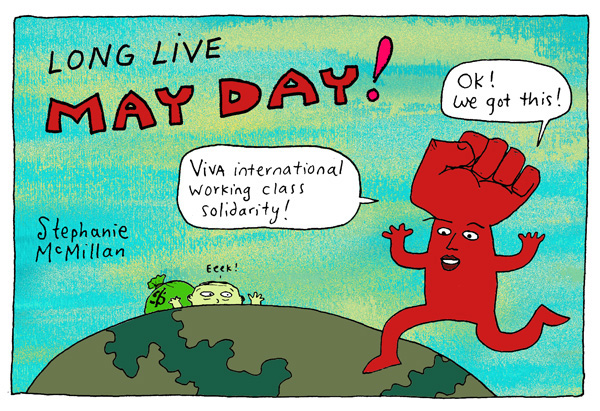 The root of the disease was political. The treatment could only be political. Of course, we encourage aid that aids us in doing away with aid. But in general, welfare and aid policies have only ended up disorganizing us, subjugating us, and robbing us of a sense of responsibility for our own economic, political, and cultural affairs. We chose to risk new paths to achieve greater well-being.
The root of the disease was political. The treatment could only be political. Of course, we encourage aid that aids us in doing away with aid. But in general, welfare and aid policies have only ended up disorganizing us, subjugating us, and robbing us of a sense of responsibility for our own economic, political, and cultural affairs. We chose to risk new paths to achieve greater well-being.
– Thomas Sankara on Western aid
Class Struggle and International Solidarity
As soon as people heard of the ravages done by Hurricane Mathew, mostly in Southern and Northwestern regions of Haiti, many were volunteering to send support. Some even posted online what they perceived as reputable NGOs. But for us, whether or not some NGOs are reputable, the point to ask is whether or not sending money to NGOs, even reputable ones, is in the best interest of the Haitian popular masses. This is especially the case after the earthquake of January 2010, in which millions of dollars poured in for the same reasons of support and Haiti today remains in even worse shape. We hear the arguments that quick-fix support is important for the immediate survival of people, but we face the facts already proven in previous catastrophes that, for the long term, those quick fixes have become part of the problem and only represent a bail out for the Haitian dominant classes, the State Apparatus and imperialism.
As those catastrophes continue to occur internationally, other dominated and exploited classes from their respective societies will also manifest their spontaneous need to support and be interdependent with the most affected victims, with a total spirit of abnegation. This solidarity is a precursor, although limited, of the need for solidarity and internationalism, which under the leadership of conscientious social classes could become a powerful force underpinning the construction of new societies. But to realize this positive spirit of interdependency, progressive and revolutionary forces must promote a correct conception of internationalism and of solidarity based solely on the interests of the popular masses. We must demarcate ourselves from bourgeois conceptions that finally end up bailing out the dominant classes, the state apparatus and imperialists. Under capitalist direction, humanitarian aid is a bourgeois conception that inevitably serves bourgeois interests.
Haiti is Not a Poor Country
Haiti is a rich country. Much of our wealth has been stolen or is being stolen. The Haitian dominant classes should not be viewed as part of the popular masses in any scientific or materialist class analysis. In any social formation, the capitalist class and feudal classes are not part of the popular masses. Their nationalism is based solely on the interests of the power block exercising its class dictatorship over the popular masses, especially the proletariat.
Humanitarianism supports a parasitic form of capital accumulation
In fact many fractions of the capitalist class, especially the bureaucratic bourgeois and imperialist institutions such as NGOs are using the donations of well-intended people as a parasitic form of capitalist accumulation. This has even been documented as a growing trend of “disaster capitalism.”
Humanitarianism Promotes Dependency
We are not arguing that acts of solidarity, even humanitarian, are not warranted. On the contrary, they are necessary, but not under the dictatorship of capital. Capitalism only uses them to create a condition of dependency. Effective solidarity needs to be practiced within a revolutionary perspective of self-determination: COUNTING ON OUR OWN STRENGTH. In the response to the January 12, 2010 earthquake in Haiti, there was no attempt to promote self-determination. The politics of misery were used to guarantee capitalist accumulation. Aid, even humanitarian aid, has become one of the central forms of accumulation for the reproduction of capitalism in Haiti. As Thomas Sankara said of Western aid: “The root of the disease was political. The treatment could only be political. Of course, we encourage aid that aids us in doing away with aid. But in general, welfare and aid policies have only ended up disorganizing us, subjugating us, and robbing us of a sense of responsibility for our own economic, political, and cultural affairs. We chose to risk new paths to achieve greater well-being.”
A Quick Overview
It would be irresponsible and ultra-leftist not to ask for aid. We do support the need for donations. But the devastation of nature can’t be uncoupled from the reactionary political line of Haitian capitalism and imperialist domination. The way we deal with the devastation of nature must be determined in the field of class struggle, and now in the field of class struggle, capitalism is calling the shots. Haiti is a social formation that is rotten to the core. The inter-class struggles among the ruling classes in Haiti are secondary contradictions that provide no solution to the degradation of Haiti’s social structures. As long as capitalism is in control, as long as the policies of capitalism dominated by imperialism are in effect, exceptional crises caused by nature and the perpetual ongoing crisis caused by the anti-national and anti popular policies of the power block, the social formation will continue to deteriorate and reach a barbaric state in which the unacceptable becomes the norm of the day.
What Is to Be Done?
Although support is necessary at this time, progressives and revolutionaries must always denounce the role of the anti-national, anti-popular politics of capitalism in Haiti and demarcate themselves from the alternatives given to us by capitalism and imperialism. We must offer our own alternatives. Haiti is a failure of capitalism and imperialist domination. Our alternatives should be based on two aspects:
1] International solidarity and internationalism should start with progressives and revolutionaries organizing against their class enemies in their respective social formations, especially in the belly of imperialist social formations. Our future, in all social formations, can’t be based on whom we vote for but rather on our own capacity to organize in our interests and under the perspective of classes that have the most interest to rid humanity of capitalism.
2] Identifying organizations and movements we can support, from the perspective of unity and collective struggle for the conquest of popular democratic rights and the elimination of capitalism and feudalism. The more we organize and struggle in our own social formation, the more our vision of international unity and solidarity and internationalism will sharpen and consolidate. The more we demarcate from populism and opportunism the more our international unity will consolidate.
In Haiti, the MayDay Batay Ouvriye Federation of unions is a combative movement of laborers and workers that is organizing to struggle for the conquest of popular democratic rights. Batay Ouvriye [BO] is organizing workers and has worked to set up to unions in the garment industries in Port-au-Prince, Carrefour, Ouanaminthe and Caracol. BO is also organizing poor peasants in rural communal sections of Haiti as well as agricultural workers. Most recently, the Organization of Laborers and Landless Peasants [OPTST] held its first general assembly. Under the leadership of the most advanced workers, BO is constructing a combative path to conquer popular democratic rights battling feudalism and capitalism.
Compounding ruling class repression, Mathew has hit BO as a movement among the popular masses. Some of our members in rural areas have lost their homes and the means to sustain themselves. In the face of this crisis, we urge progressives and revolutionaries to extend their solidarity directly to BO in support for the continuing struggle for popular democratic rights.
The devastation Hurricane Matthew left behind is yet another proof of the anti-national and anti-popular nature of the Haitian ruling classes, their state apparatus and imperialism. As global capitalism fuels growing environmental disasters, dominated and exploited masses all over the world must organize to build political organizations and movements to confront directly the mother of all catastrophes and disasters: CAPITALISM.























